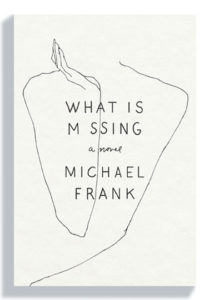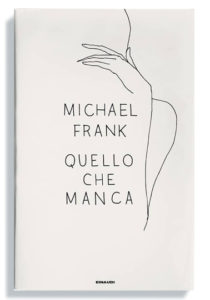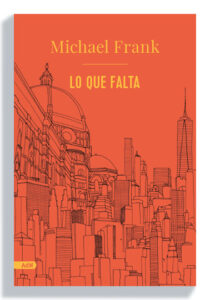One of the hardest, most heartbreaking experiences that can come at a woman as she eases out of her thirties is to discover that she cannot have a baby. As Michael Frank’s What Is Missing opens, Costanza Ansaldo, a half-Italian and half-American translator, has traveled to Italy one summer to restart her life a year after the death of her husband, the famous writer Morton Sarnoff. She is turning forty and has made an uncertain peace with both her grief and her childlessness. Visiting the pensione in Florence where she spent many happy times as a girl, she meets Andrew Weissman, an acutely sensitive seventeen-year-old, and his father, Henry Weissman, a charismatic New York physician who specializes in—as it happens—reproductive medicine. These encounters change the way Costanza thinks about herself—and, eventually, her future.
The three meet again that fall in New York, where the relationships turn and tighten with combustive effects that cut to the core of what it means to be a father, a son, and a potential mother.
Suspenseful and gripping, What Is Missing is a psychological novel that, like the author’s prizewinning memoir, The Mighty Franks, asks who we are, and who those closest to us are, when life puts us to disturbing and powerful tests.
“Michael Frank’s masterful and psychologically acute first novel—which leads us with equal confidence through the light-saturated streets of Florence and the hushed and polished halls of Upper East Side New York—asks the most urgent questions about biology and nurture, about filial and parental love, and about what we’re willing to suffer to find out who we are. This is a wise and necessary book, one I’ve been recommending ardently to everyone I know.”
— Julie Orringer
“This sophisticated erotic triangle of a novel is by turns sensuous and harrowing, driven by a point-of-view roulette that is masterfully played. For readers unfamiliar with the experience of assisted reproduction, Michael Frank’s novel is an eye-opener. The ethics-straining extremes left me thinking about the dire need to balance power between women and men long after I sped to the last page.”
— Rachel Howard
“As the novel probes relationships laced with curiosity and resentment, what stands out is Costanza’s restive questioning of her impulses. The result is a penetrating examination of how a life can be defined by contingency and surprise, marked both by the absence of things long dreamed of and by unexpected presences.”
“The novel is filled with trenchant moments of sweetness and betrayal, as well as a stunning reveal of the harrowing gauntlet infertile women go through to conceive. This is an intricate and dynamic examination of familial ties: both what strengthens them and what can tear them apart.”
“Frank explores the ways that scientific breakthroughs have caused the legal meaning of family to become detached from its genetic definition. The complicated family unit he ultimately forms is very much like this rewarding novel…built on uncharted ground.”
—Sam Sacks, The Wall Street Journal
“When a woman’s husband, a famous writer, dies, she finds herself back in her childhood city of Florence, where she meets a sensitive teen and his charismatic father. What ensues between them is part love-triangle, part surrogate family, described with Frank’s habitual acuity, empathy, and fearlessness.
—Emily Firetog, listing What Is Missing on Lit Hub as “one of the 10 new books you need to read this week.”
“Frank’s psychologically astute, engrossing debut novel demonstrates his keen instinct for family dynamics that was evident in his fascinating memoir, The Mighty Franks, which focused on his bewitching, powerful screenwriter aunt. At the center of What Is Missing are a divorced father who is a famous fertility specialist, his long-limbed adolescent son, and a dazzling Italian American translator, recently widowed – each marked by disappointment, profoundly burdened by deeply held secrets, and yearning for family. From Florence to the New York’s Upper East Side, Frank’s compelling characters each contend with their inchoate sense of self and their abiding need for family.”
—The National Book Review, naming What Is Missing one of its five hot books
“ ‘Of course my son comes up with you. Literate, a thinker—I can tell. Gentile, European, so different. Serene—on the outside. Inside, who knows. But clearly not like Her Whose Name Shall Not Be Spoken. The opposite. That is what men do, when they have been broken.’ ”
—From an excerpt of What is Missing on Tablet
“The phrase comes from a poem by Mark Strand, and it applies in many ways—a longed-for child, withheld information, family members who died in the Holocaust, missing connections between a man and a woman, a father and a son, one brother and another . . .”
—From a conversation about What Is Missing on Work In Progress
“At one of the first public conversations I had about What Is Missing, my novel, a young member of the audience asked me how crucial setting was to finding my way into a book. It was a little disconcerting, because I felt so seen into—it was as if he’d figured out my trick!”
—From a photo essay about What Is Missing on Work in Progress
“Un libro bellissimissimissimo. Ti ci butti dentro e non riesci più ad uscirne…Una storia di famiglia allargata ma chiusissima, di segreti mai svelati, di dolori sepolti. Il bisogno struggente di vita, da masticare a bocconi grossi”
—Luciana Littizzetto
“Dopo gli ottimi riscontri ottenuti con il memoir I formidabili Frank, Michael Frank si conferma narratore di grande talento, capace di incollare il lettore alla pagina pur non essendo in alcun modo leggero. I suoi sono, anzi, temi pesanti come macigni: la famiglia, innanzitutto, origine di tutto (il male), e poi il corpoe i suoi cambiamenti, la paternità e la maternità, l’amore, il lutto.”
—Pierluigi Lucadei, I Libei del Mese, Blow Up
“Quello che manca”, oltre che essere il primo vero romanzo dello scrittore e saggista newyorchese (amante dell’Italia tanto da vivere per lunghi periodi all’anno in Liguria), è un testo sulla riconoscibilità, meglio ancora sulla capacità di aprirsi alla diversità e all’imprevisto che si pone di fronte ai suoi protagonisti in luoghi sconosciuti, come succede a Firenze, o resi di volta in volta inediti da nuovi incontri, come avviene al ritorno dei tre protagonisti in una New York da vivere con occhi nuovi….Se all’inizio il racconto ha i toni dolenti che risalgono dalle pagine come fumi di passati abbandoni, nel suo incedere si illumina di una luce che se a tratti spaventa apre nuove possibilità”
—Giacomo Glossi L’Eco di Bergamo
“Dopo averci divertito con i ricordi della sua stravagante famiglia, Michael Frank toma con un vero e proprio romanzo partendo dall’Italia, ormai il suo paese d’adozione….In questo particolare triangolo, ognuno prova a colmare ‘quel qualcosa che manca’, cerca di chiarire prima di tutto a sé stesso chi è davvero, insegue segreti e risposte a bisogni biologici primari, come l’avere figli e riuscire poi a essere veri genitori. Con uno sguardo speciale e profondo sui sentimenti di Costanza, sui suoi impulsi e il difficile cammino che, come molte altre donne, affronta accettando la fecondazione assistita.”
—Liana Messina, F
“Nel suo nuovo romanzo, Quello che manca, Michael Frank indaga sulla fecondazione assistita dal punto di vista emotivo, le promesse che porta con sé, la paura di non essere all’al tezza della scienza.”
—Giorgia Mecca, Il Foglio
“Pieni e vuoti. È cosi nella musica, nella danza, in un quadro riuscito, in un libro appassionante e, ovviamente, nella nostra vita. La grazia è un equilibrio di pieni e di vuoti, carenze da colmare, eccessi da sfrondare. Un figlio, un sogno, la realizzazione personale: siamo sempre a desiderare qualcosa che, crediamo, ci renderà l’esistenza più completa e ci porterà a conoscere qualcosadi più su noi stessi. È uno dei tanti significati profondi di Quello che manca.”
“Volevo fare il ritratto di un esperienza molto forte, presentando tre dei casi possibili. Il desiderio di un bambino arriva a un certo punto nella vita degli uomini e delle donne: È un momento molto specifico, preciso, improvviso. Anche Costanza, la protagonista, ne sorpresa”
—da un’intervista con Elena Nieddu, Il Secolo XIX





